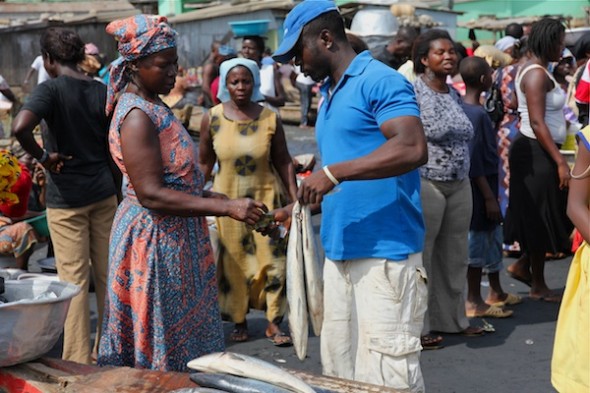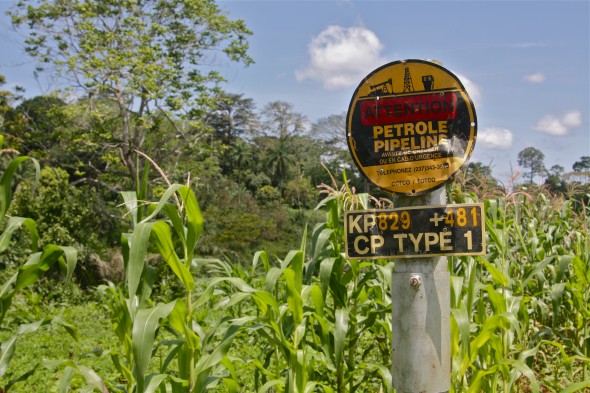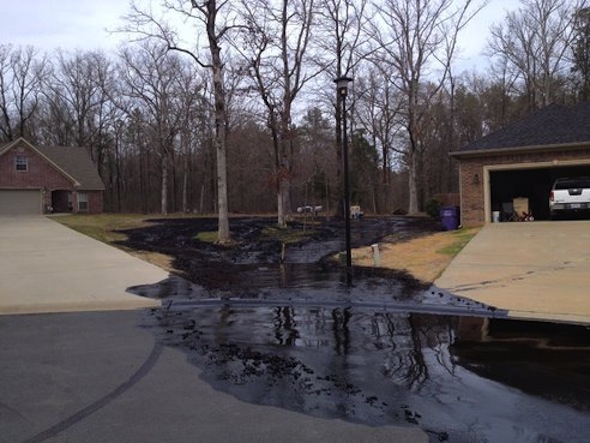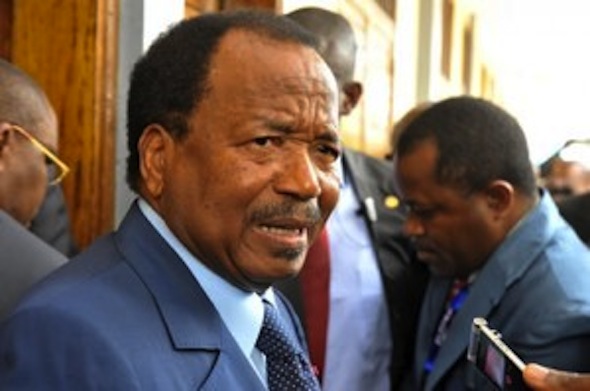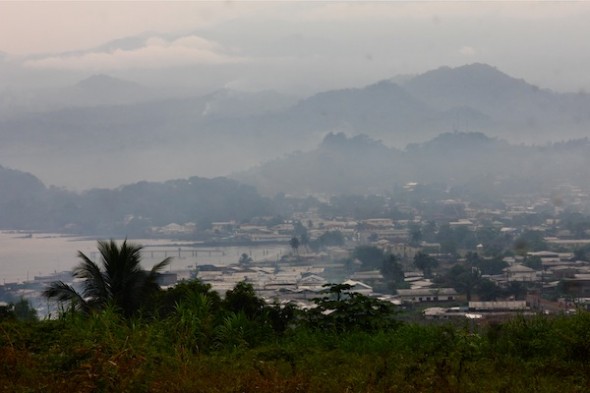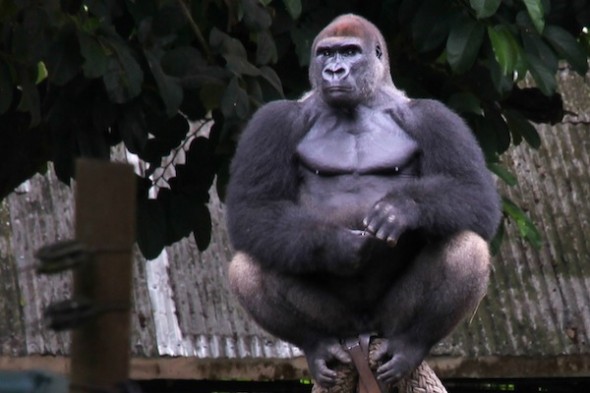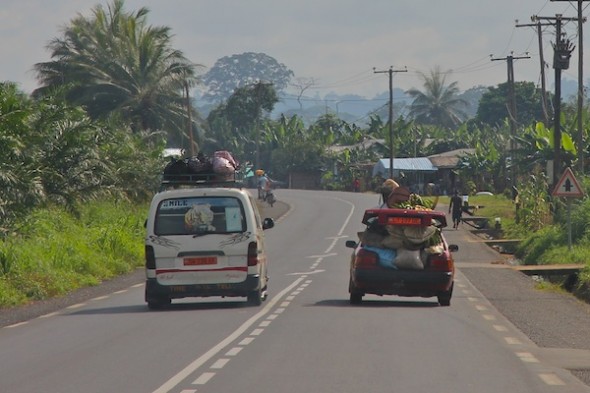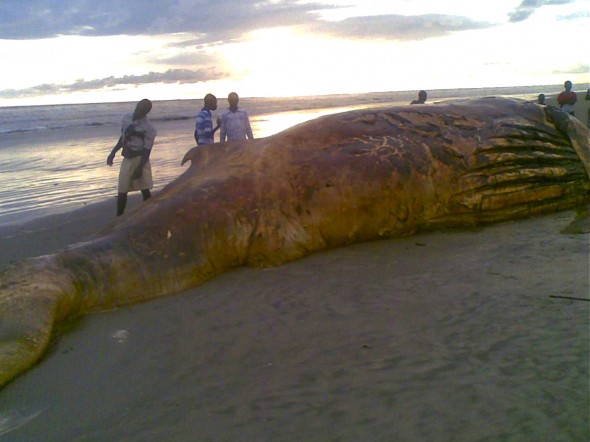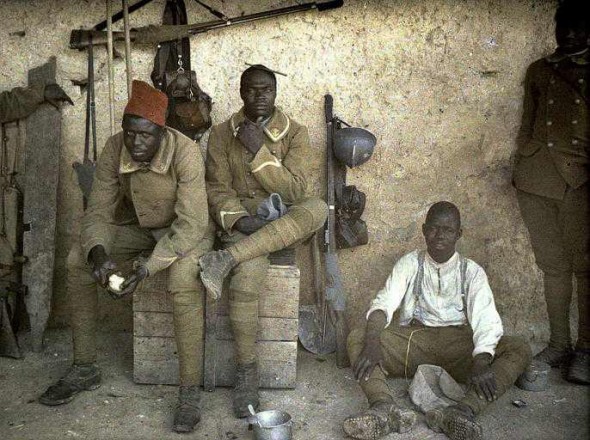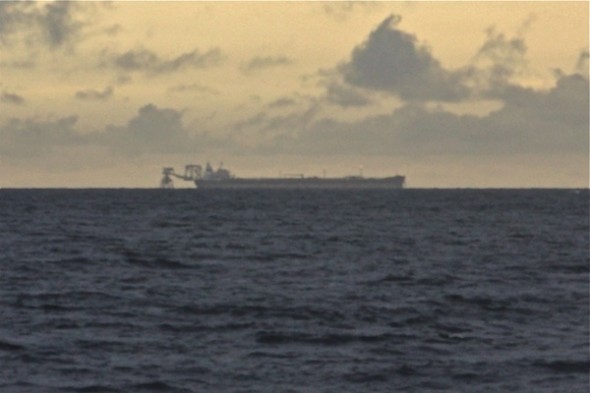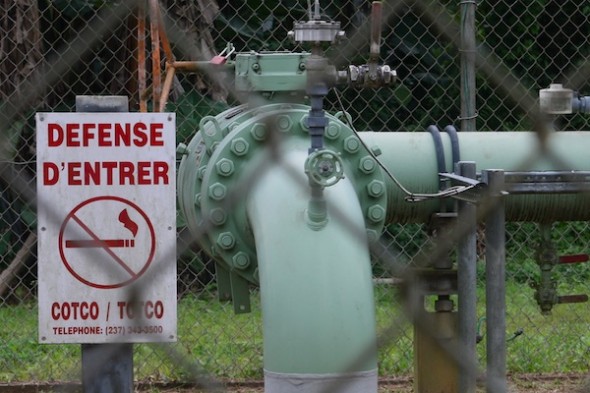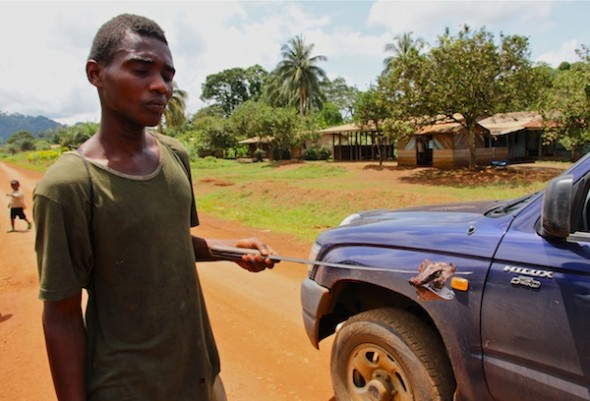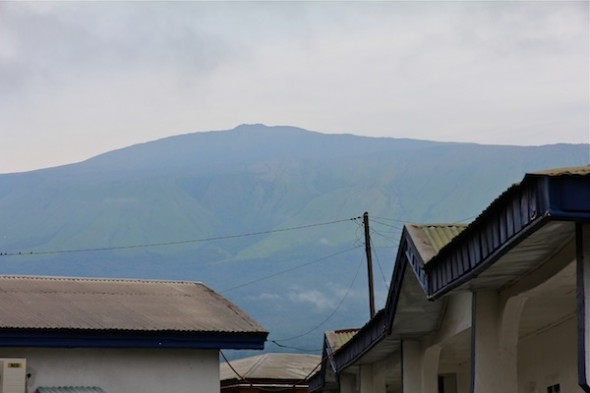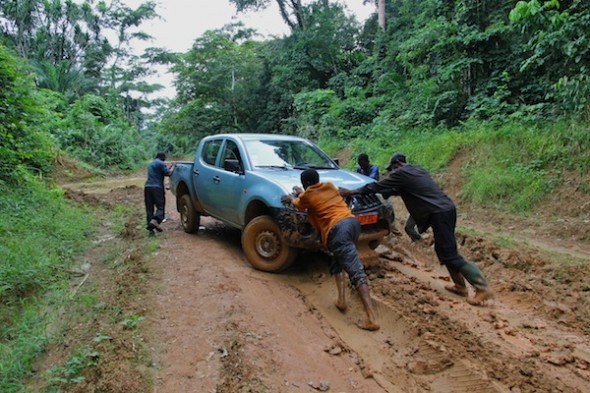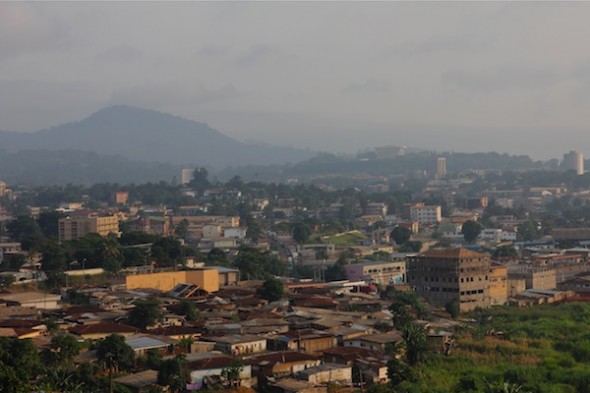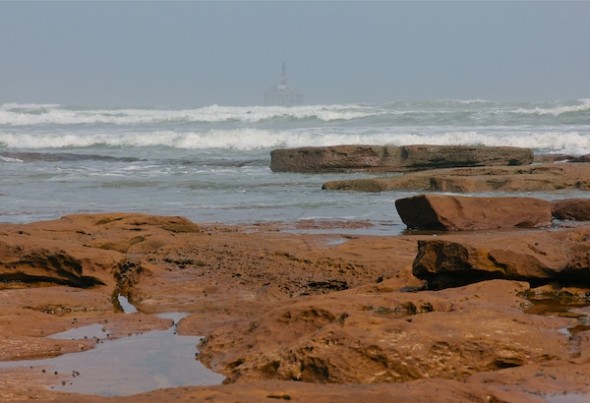Oil vs. fishing in Ghana — the conflicts continue
It has been ages since I’ve posted anything here (more on that below), but it seems that nothing much has changed — at least not for the fishing communities of Western Ghana. I first reported on conflicts between fishermen and Ghana’s new oil industry more than three years ago. Since then, oil exploration and drilling have increased, and the situation for fishermen has deteriorated. In the last few months three reporters have contacted me to talk about conflicts between fishing and oil.
Better late than never: Cameroon renegotiates pipeline transit fees
After ten years of operations, Cameroon has finally managed to renegotiate the paltry transit fees it collects on the Chad-Cameroon pipeline.
Cameroon will now receive 618.02 CFA francs ($1.30) per barrel of oil, up from 194.91 CFA francs. Since 2003 Cameroon was collecting less than U.S. 45 cents per barrel, a rate that was not linked to inflation or to the price of oil. Nor was the rate subject to regular review. Even the current rate, $1.30 per barrel, is low, but it will at least be raised every five years based on the rate of inflation.
The quantity of oil coming down the pipeline will soon increase as Niger has signed an agreement to use the pipeline. China National Petroleum Corporation (CNPC), the operator in Niger, will also use the pipeline for its Chadian operations. Exxon Mobil has not disclosed how much CNPC will pay to use the pipeline.
Read more:
Pipeline Tchad-Cameroun: Le droit de passage passe de 194 FCFA à 618 FCFA par baril
Niger awards second oil permit to CNPC, plans exports
Chad’s oil: 10 year anniversary, nothing much to celebrate
It was on October 10th 2003 that Exxon Mobil and its partners officially inaugurated the Chad-Cameroon Oil Project. The press release marking the event was positively jubilant:
Addressing inauguration attendees, Morris Foster, president of ExxonMobil Development Company, said, “It is with great pride that I am here today to celebrate this tremendous accomplishment with everyone who has been involved in the Project. I want to personally thank President Deby and President Biya for their support along with important contributions of our co-venturers, Petronas and ChevronTexaco, and the World Bank Group for their commitment to this Project.
“Today we celebrate not only what was achieved during the construction but Esso, as operator, also celebrates the manner in which it has been accomplished,” Mr. Foster added. “We maintained our long-term focus on this project over 27 years of effort and changes in the consortium, increased the known oil reserves to commercial levels and helped turn a vision in 1976 into a reality. We believe this project will help prepare a brighter future for the citizens of Chad and Cameroon, and I am proud we are part of it.”
Another Exxon Mobil pipeline ruptures
Exxon Mobil pipeline problems are back in the news and this time it’s in Arkansas.
From InsideClimate News: A pipeline that ruptured and leaked at least 80,000 gallons of oil into central Arkansas on Friday was transporting a heavy form of crude from the Canadian tar sands region, ExxonMobil told InsideClimate News.
Local police said the line gushed oil for 45 minutes before being stopped, according to media reports.
Crude oil ran through a subdivision of Mayflower, Ark., about 20 miles north of Little Rock. Twenty-two homes were evacuated, but no one was hospitalized, Exxon spokesman Charlie Engelmann said on Saturday.
In an interview with InsideClimate News, Faulkner County Judge Allen Dodson said emergency crews prevented the oil from entering waterways. The judge issued an emergency declaration following the spill and is involved in coordinating clean-up efforts among federal, state and local agencies and Exxon.
Exxon fails to address pipeline safety risks, fined $1.7 million
“The U.S. Department of Transportation on Monday hit Exxon Mobil Corp. with a $1.7 million fine over a July 2011 pipeline failure that dumped more than 60,000 gallons of oil into Montana’s Yellowstone River after concluding the oil giant failed to effectively address pipeline safety risks,” writes Sean McLernon in the March 26th edition of Law360.
According to a news release from the Department of Transportation’s Pipeline and Hazardous Materials Safety Administration (PHMSA), “ExxonMobil failed to properly address known seasonal flooding risks to the safety of its pipeline system, including excessive river scour and erosion, and to implement measures that would have mitigated a spill into a waterway.”
I wrote about the Yellowstone River spill in September 2011 asking what lessons the Montana accident might have for Cameroon. To recap what I said then, environmentalists in Cameroon and Chad have long been concerned about the safety of the 1070 km Chad-Cameroon oil pipeline and have stated repeatedly that COTCO (Exxon Mobil pipeline operations in Cameroon) has not provided reliable information about its real capacity to respond in the event of an oil spill. Much of the pipeline crosses relatively remote and hard-to-access areas (few or no roads) and many question COTCO’s assertions that response teams could quickly travel to the scene of any incident.
More elections in Cameroon. Does anyone care?
Nearly 20 years after deciding that Cameroon needed a Senate, President Paul Biya recently announced that the country’s first Senate elections will be held on April 14, 2013. He made the surprise announcement at the end of February, leaving little time to organize a credible election.
Voters will elect 70 senators, while Biya will hand-pick the remaining 30, according the presidential decree read over state radio.
The SDF, Cameroon’s main opposition party, loudly denounced the elections and pledged a boycott, then in a awkward volte face several days later, agreed to participate. SDF party members now say the party will participate in the Senate elections as it does not think Biya, 80, will make it to the end of his term.
According to the Cameroonian constitution, the head of the Senate would assume the interim in the event of a mid-term presidential vacancy.
Biya’s planned senatorial elections seem to indicate that he is interested in perpetuating the status quo of Cameroonian politics into the post-Biya era.
Limbe: conflicted tourism
Limbe, in Cameroon’s Southwest Region, is a gem. A coastal city famous for its black sand beaches, Limbe is located on the southern slopes of Mount Cameroon, one of Africa’s largest active volcanoes. The town is surrounded by lush forest and is home to the Limbe Botanic Garden, a 48-hectare expanse of majestic greenery bordering the Atlantic.
The Limbe Wildlife Centre is another one of the city’s attractions. The center was founded in the early 1990s as a rescue and rehabilitation center for orphaned primates. The first time I visited the center it was an open space. I’ll never forget the gorilla who stood on two legs and walked straight up to me as if he wanted to say something. Amazing. Today, the center is divided up into compounds and feels more like a zoo, but it’s still a great place to visit and marvel the biodiversity of this country.
But there’s more to Limbe than beautiful scenery.
2013…Smile!
Happy New Year and best wishes to all my friends, colleagues and readers. May we all have good news to report in 2013!
Offshore drilling, noise and whale deaths: is there a connection?
While working in Ghana last year, I learned that an unusually high number of dead whales had washed ashore since the start of oil drilling. I talked to several local environmentalists who feared the deaths were connected to the country’s oil industry but had no resources to investigate. Without offering any details or study results, the Ghana EPA declared the whale deaths were unrelated to the oil industry.
Although there had been no significant oil spills in Ghana, another form of pollution, which may have played a role in the whale deaths, was ongoing yet invisible: Noise pollution. Shipping and drilling are two known causes of significant underwater noise. Noise pollution — especially when it’s below the ocean surface — doesn’t get much attention. But as a recent article in the New York Times points out, the world’s oceans are increasingly noisy and the impact on marine life, mammals in particular, may be devastating:
Cameroonian enterprise in…China
As my last post indicated, doing business in Cameroon is tough. But if the business climate is less than ideal for foreign investors, it’s even harsher for Cameroonians who don’t benefit from the incentive programs in place to attract foreign investment.
Kingsley Azieh Che was one of several Africans I met who run manufacturing companies in Guangzhou, China. Azieh Che, who is Cameroonian, attended university in Cameroon, but set up his business in China. Today he runs an apparel factory. He began buying ready-made clothes in China; as the business grew he started ordering custom-made clothing and when his orders became too large for his suppliers, Kingsley Azieh Che decided to go into manufacturing. He now takes orders from clients around the world.
Invest in Cameroon…Are you crazy?
Forbes’ Best Countries for Business list is out and Cameroon arrives at 137th place out of 141 countries ranked.
New Zealand the number one “Best Country for Business”, followed by Denmark, Hong Kong, Singapore, Canada, Ireland, Sweden, Norway, Finland and United Kingdom. The United States, with its “inadequate investment in deteriorating infrastructure, rapidly rising medical and pension costs of an aging population, sizable current account and budget deficits – including significant budget shortages for state governments – energy shortages, and stagnation of wages for lower-income families,” comes in at 12th place.
The countries at the bottom of this year’s list — the ten worst countries for doing business — are Cote d’Ivoire, Yemen, Mauritania, Ethiopia, Haiti, Cameroon, Venezuela, Zimbabwe, Chad and Guinea.
Thoughts on Remembrance Day from Cameroon
As Remembrance Day (Veterans Day in the U.S.) commemorations take place across Europe and North America, the descendants of African soldiers recruited to fight for the imperial forces during the two World Wars also remember service and sacrifice. These children and grandchildren continue to honor those who served and died, most without any recognition of their service or military pension.
Remembrance Day without Isaac
By Christopher Fon Achobang
Envoys of the German Embassy, British, Nigerian, South African, and Canadian High Commissions and the local administration of Cameroon, represented by the SDO of Fako Division met in Victoria, now Limbe, to ‘Remember’ the valiant soldiers who fell fighting for the crown of England in both World Wars. This is an annual event celebrated all over the British Commonwealth.
While U.S. votes, Cameroon “celebrates”
While Americans went to the polls to decide if Barack Obama would serve a second term, Cameroonians “celebrated” the 30th year in office of their president, Paul Biya.
Those who felt that 30 years in power was a cause for protest, rather than celebration, were met with tear gas and water cannons when they attempted to stage a peaceful opposition event.
“We had just started the peaceful march when a large number of well-armed police and gendarmes deployed by the repressive regime of Biya used water cannon, teargas and other weapons to disperse and brutalise thousands of our activists,” Jean Michel Nintcheu, an opposition member of parliament, told Reuters by phone from Douala.
The resource curse: money and beyond
It’s time to connect the dots and add environmental impacts into the equation.
The resource curse — and how to break it — has been getting some much-needed media attention lately. Unfortunately, however, we’re not getting the whole story.
Cameroon hires company for oil spill clean-up, nine years behind schedule
You learn all kinds of crazy things reading the news. Cameroon Online published a story from APA news on August 19th, Une firme francaise va faire de la depollution maritime au Cameroun.
According to the story, Cameroon’s Societe Nationale des Hydrocarbures (SNH, the state oil company) has signed an agreement with French company, Le Floch Dépollution, for maritime oil spill clean-up operations.
Better late than never.
Cameroon athletes “disappear” from Olympic Village

Photo: Cameroon's delegation takes part in the opening ceremony of the London Olympics on July 27, 2012. Credit: Christophe Simon / AFP/Getty Images
While President Paul Biya was jetting off to Switzerland for a “short, personal visit,” a number of the Cameroonian Olympic athletes bailed on Team Cameroon.
The Los Angeles Times reports:
Seven Cameroonian athletes have disappeared from the Olympic Village in London, a Cameroonian official said. Five boxers, a swimmer and a soccer player are missing, the state Cameroon Tribune reported, citing Team Cameroon chief David Ojong. The first to disappear reportedly was female soccer goalie Drusille Ngako, followed by swimmer Edingue Ekane Paul. The five boxers then vanished.
Pipeline news
Although the work I’m doing now in Cameroon is not directly related to the Chad-Cameroon pipeline, I’m getting updates on the pipeline as possible.
Last week I had a meeting at the Ministry of the Environment and Conservation and learned that Cameroon is once again trying to renegotiate the transit fees it receives for pipeline use. Although most of the pipeline is in Cameroon, which means that most of the environmental risk is in Cameroon, the country benefits only minimally from the operation. Most of Cameroon’s revenues from the project come in the form of transit fees collected on the oil pumped through the pipeline. Even at the time of signing, the rate (41 cents per barrel) was low and to add insult to injury, the transit fee isn’t indexed to inflation or to the cost of oil.
In the nine years that the pipeline has been operational, Cameroon has watched the price of oil skyrocket while its meager transit fees have remained unchanged. (See my December 2010 post on the lack of transparency surrounding Cameroon’s earnings from the pipeline.)
The road adventure continues
“Beware of the viper! He is venomous even after he has died.” This one was still writhing when we pulled up next to the group gathered at the side of the road. It sounded like a veiled warning.
Kosmos Cameroon: Oil exploration in a national park?
Kosmos Ghana gets most of the attention, but since I’m in Cameroon I decided to take a look at Kosmos Energy’s operations here. The company has a 100% interest in two onshore blocks, the Ndian River and Fako. Kosmos is also a non-operating partner (with a 30% interest) in a third block, the Kombe-Isepe. The company’s website provides some basic information on the blocks, including their size: “The company’s acreage position onshore Cameroon is the equivalent of more than 200 deepwater Gulf of Mexico blocks.”
Both the Ndian River and the Fako blocks are located in the vicinity of Mount Cameroon and the proposed Mount Cameroon National Park. In fact, a significant percentage of the Fako block is inside the proposed national park (Fako is another name for Mount Cameroon). The Ndian River block may also overlap the western edge of the park. The Kombe-Isepe block is located further east, between Douala and Edea.
There’s no information on the Kosmos website to indicate that the Cameroonian blocks are located in sensitive areas.
Access difficult
Difficult roads and no internet. More soon…
Yaounde landing…
I haven’t had a chance to post anything for a few weeks. I’ve just arrived in Yaounde, Cameroon, and hope to have more time to get information up in the coming days. I’m starting some new work and will look forward to writing about it.
In the meantime, I want to provide links to a few articles up at Ghana Oil Watch. As the months go by, the Jubilee Field projected 120,000 b.p.d. output level is looking increasingly like wishful thinking. It has been hard to get clear information on why — exactly — production is so low. Tullow and its partners have repeatedly cited technical issues as the cause, yet now that those issues are supposedly resolved, why haven’t production levels increased?
New pipeline safety report: Much room for improvement
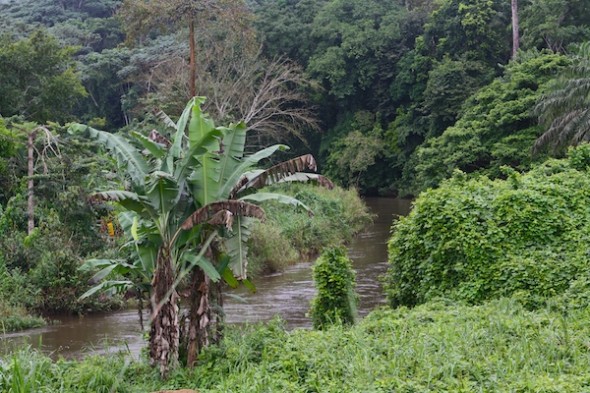
Vulnerable to dangerous spills: The Chad-Cameroon pipeline crosses a number of rivers in remote, densely forested areas. Photo: Christiane Badgley
The New York Times Green Blog reports on a new pipeline study from the U.S. National Wildlife Federation (NWF).
Times reporter Dan Frosch writes that the NWF study, “asserts that federal laws regulating oil pipelines are inadequate in several crucial areas and that local regulations do not provide sufficient protection against safety and environmental risks.”
The NWF report was prompted by a July 2010 rupture of an Enbridge Energy Partners oil pipeline in Michigan that spilled some 1 million gallons of crude oil, contaminating more than 30 miles of a major Lake Michigan truibutary. According to NWF, the incident, “raised health concerns and killed wildlife. It also exposed numerous weaknesses in pipeline regulation.
Lloyd’s of London to Arctic would-be drillers: Slow down
The Guardian is reporting that Lloyd’s of London, the world’s largest insurance market, has voiced concern about proposed offshore Arctic drilling. The company says clean-up of any spill would present, “multiple obstacles, which together constitute a unique and hard-to-manage risk.”
Reading the article, several paragraphs jumped out because they could also be useful for policy makers in Africa, many of whom are jumping on the drilling bandwagon without having adequate safety and emergency response systems in place:
Richard Ward, Lloyd’s chief executive, urged companies not to “rush in [but instead to] step back and think carefully about the consequences of that action” before research was carried out and the right safety measures put in place….
Other than the direct release of pollutants… there are multiple ways in which ecosystems could be disturbed, such as the construction of pipelines and roads, noise pollution from offshore drilling, seismic survey activity or additional maritime traffic….
From one disaster to another
The two year anniversary of the Deepwater Horizon explosion is just a days away, and as Bryan Walsh from Time magazine puts it, the “oil spill seems to divide people into two categories: those who can’t forget, and those who refuse to remember. In the first camp are Gulf Coast residents and environmentalists who say the region still hasn’t recovered from the worst oil spill in U.S. history, and who are still waiting to be made whole—as BP once promised. In the second is much of the oil industry and many Republicans, who like to complain that offshore drilling has slowed under President Obama, yet seem to forget the multi-billion dollar damage that the oil spill left, and the months it took to repair the Macondo blowout.”
You can read more in his article, Nearly two years on, did the BP oil spill have to happen to BP?
And while we’re wondering about the inevitability of BP’s spill, Total’s North Sea gas leak appears to be much worse than originally reported:
Sitting on a powder keg of highly flammable natural gas and gas condensate, the French oil major’s rig could be one of the worst oil disasters in the North Sea. A gas cloud, made mostly of methane, has essentially enveloped the rig after attempts to shut a troubled production failed and caused a leak. If this cloud — which is growing by roughly 200,000 cubic meters a day — ignites, it could be catastrophic.
Clearly, the potential for human and environmental tragedy is the paramount concern here, much as it was with BP’s Gulf of Mexico disaster.

